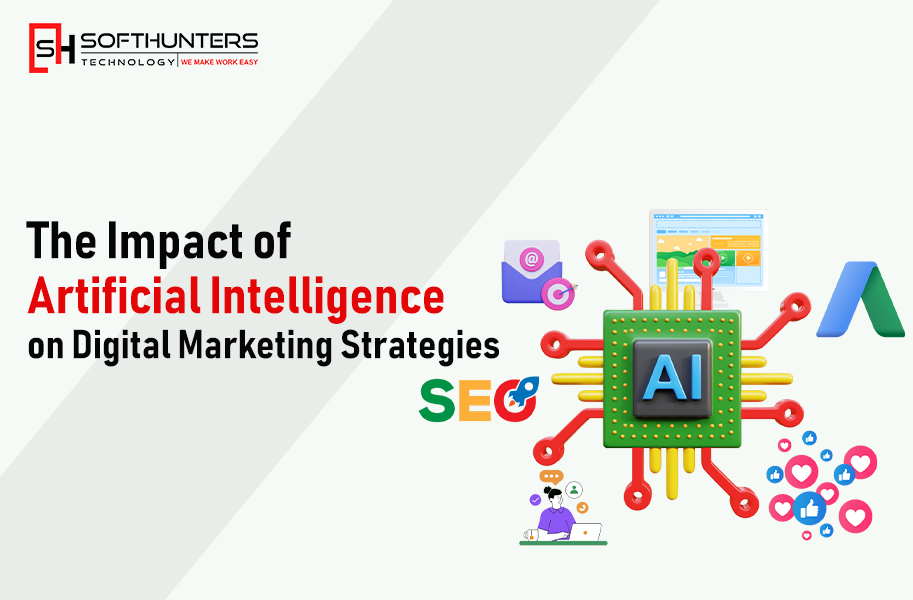The digital era of our rapidly paced world has seen Artificial Intelligence (AI) disrupt how business is done, particularly in the digital marketing service sector. Predictive analytics and personalized advertising are just the beginning: AI has entirely changed the way brands reach out to their target audiences. It’s not only automation, but smarter choices, better customer experiences, and data-led outcomes that change the parameters of marketing success.
1. Understanding Role of AI in Digital Marketing
Artificial Intelligence in digital marketing is the application of intelligent technologies that can mimic human intelligence to understand the data, forecast trends, and make automated decisions. It assists marketers in gaining insight into consumer behaviors, targeting content, and creating marketing campaigns with accuracy.
AI is no longer a futuristic fantasy; it is a need. Artificial intelligence is driving every digital interaction, whether it’s Google with its AI algorithms refining search results or social media sites suggesting what to read. As a business, using AI-driven digital marketing solutions provides a competitive advantage and keeps the company relevant in a changing market.
2. Personalization: Marketing that Speaks to you
The days of marketing to everyone have long gone. The current consumers are demanding customized services. AI will allow brands to use customer data, including purchase history, location, and browsing history, to provide specific suggestions and messages.
An example is Netflix, which uses AI to recommend shows based on your viewing habits, and e-commerce platforms like Amazon, which use it to recommend the next items you are likely to purchase. This over-personalization increases engagement, conversion, and brand loyalty.
Within the framework of digital marketing services, personalization assists companies to develop targeted advertisements, generate custom e-mailing campaigns, and delivering content that will appeal to particular customer groups.
3. Predictive Analytics: Seeing the Future of Consumer Behavior
The predictive powers of AI are transforming digital marketing tactics. Predictive analytics help marketers to understand customer needs and behaviors even before such needs are expressed.
As an example, artificial intelligence can process large amounts of information collected through multiple channels, such as social media, web traffic, and past purchases, to predict tendencies in the future. This gives companies the ability to act in anticipation and not in response.
Predictive analytics allows a marketer to:
- Determine more likely leads.
- Maximize advertising expenses by reaching quality audiences.
- Create advertisements and launch campaigns when they will have the greatest impact.
It will include wiser marketing decisions, higher ROI, and better customer satisfaction.
4. Chatbots and Conversational AI: 24/7 Engagement
AI-powered chatbots and virtual assistants have revolutionized the approach to customer service. These tools are changing the nature of how business interacts with their customers as they provide 24/7 real-time support.
AI chatbots can answer frequent questions, suggest items, and even instruct customers on how to buy something, without involving humans. Chatbots have been introduced on platforms such as WhatsApp, Facebook Messenger, and websites as a way of enhancing user interaction and customer service.
In the case of digital marketing services, conversational AI improves user experience, brand trust, and helps save valuable resources and time. It helps keep business constantly available, and gives immediate responses which help enhance satisfaction and retention.
5. AI-Powered Content Creation and Optimization
Content is the core of digital marketing, and nothing is as easy as AI has made it to be in creating and optimizing content. Now, AI-powered tools can write product descriptions, social media posts, and even blogs based on user information and industry trends.
In the case of Jasper AI and Copy.ai, as platforms, they help marketers create interesting content that aligns with the interests of the audience. Also, AI-based search engine optimization tools can suggest high-performing words, optimize the meta description, and study the competitors.
With the addition of digital marketing services, these tools make sure that content is not just attractive but it converts. Companies are in a position to sustain quality, tone, and relevance across all marketing media with ease.
6. Programmatic Advertising: Smarter Ad Targeting
The AI has redefined online advertisement by providing programmatic ad buying, where AI automates the process of buying ads. It finds the most suitable people, and the most positive bids and ads on various platforms are offered in real time.
This approach does away with trial and error and makes sure the correct people see the correct ads at the appropriate time. It is quicker, efficient, and cheaper than traditional ad placement.
Businesses can attain:
- Increased click-through and conversion.
- Reduce advertising expenses owed to accurate targeting.
- Constant campaign optimization using real-time performance data.
Programmatic advertising has streamlined marketing to be more strategic and result-oriented, enabling brands to make data-driven decisions.
7. AI and Visual Recognition in Social Media Marketing
Another promising area of AI and creativity is the use of visual recognition technology. Social media such as Instagram and TikTok are much more visual, and the new AI can process pictures and videos to interpret the presence of a particular brand, trends, and engagement rates.
As examples, AI can identify the logo of a brand in a user-created post or even gauge human responsiveness towards a specific image. It can help marketers narrow down their visual approach and learn what the target audience will respond to the most.
Introduced as a part of digital marketing services, AI-powered visual analytics allow brands to track their image, improve influencer partnerships, and build the appearance of visually appealing campaigns that attract attention and motivate them to engage.
8. Voice Search Optimization: The Future is Here
Voice search is transforming the approach to SEO as more people are using smart speakers and voice assistants such as Alexa, Siri, and Google Assistant. The use of AI is vital in decoding natural language and user intent when making voice queries.
Companies must now ensure they make the best use of their content to help them get conversational search results as opposed to text search. Questions such as the best pizza around me, or how to study digital marketing are on the rise.
Digital marketing services can also be used to make brands’ voice search optimize their websites by incorporating AI insights to ensure they remain visible in this new search environment.
9. Email Marketing Automation with AI
Email marketing remains one of the most effective customer engagement tools. The AI supplements this strategy with the automation and personalization of email campaigns.
AI considers open rates, click data, and user activity to dictate when to send emails and what content is most likely to be liked. It is even able to automatically divide audiences so that every group gets the content they need.
Embarking on AI in digital marketing services guarantees an increase in engagement, improved conversion, and decreased unsubscribe rates, making email marketing smarter and more lucrative.
10. The Future of AI in Digital Marketing
The digital marketing future will be based on the constant innovation enabled by AI. With the increase in machine learning, natural language processing, and automation, marketing plans are going to be even more accurate, predictive, and personal.
AI can be expected to improve even more:
- Live decisions on placement of adverts.
- Customer sentiment Analysis and Emotion recognition.
- Virtual reality (VR) and augmented reality (AR) experiences of immersive marketing.
Among the businesses that invest in digital marketing services, it will be necessary to keep up with the trends in AI. The AI integration also means not only efficiency but also creativity, that is, the ability to help the brands establish meaningful relationships and customer loyalty in the long-term perspective.
Conclusion
The digital marketing world has indeed changed with artificial intelligence. In diversifying to refining campaigns and future consumer trends, AI enables marketers to work smarter and get quantifiable outcomes.
With the advancement in technology, AI will become even more a part of digital services marketing as it will assist companies in finding the right audience, delivering the right message, and at the right time. The brands that utilize AI now will be the ones that spearhead the marketing revolution tomorrow, more efficient, more insightful, and more human than they have ever been.







